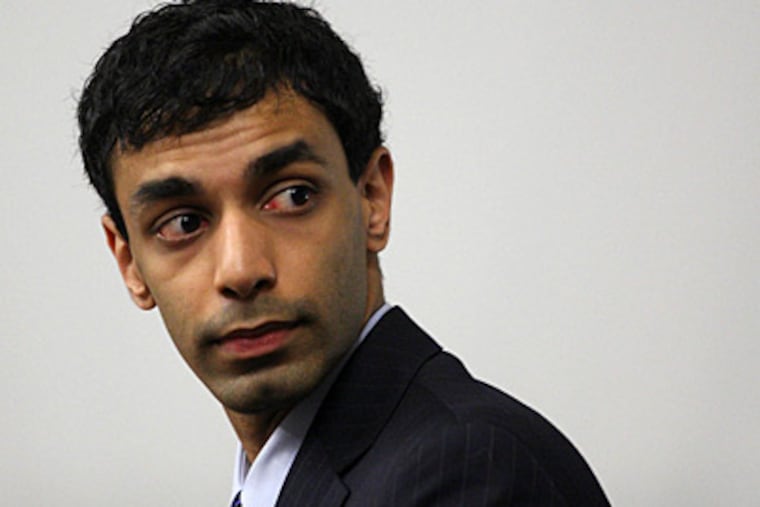Former Rutgers student asks judge to overturn webcam verdict
NEW BRUNSWICK, N.J. — Lawyers for Dharun Ravi, the former Rutgers University student convicted of spying on his college roommate kissing another man, have asked a Superior Court judge to overturn the jury’s verdict, arguing among other things that the state’s bias-intimidation law was misused. In a motion filed Tuesday, Steven Altman said that evidence in the case did not support the invasion-of-privacy conviction and that the bias-intimidation charges were unfounded. Altman asked Judge Glenn Berman to throw out the conviction or grant Ravi, 20, a new trial.

NEW BRUNSWICK, N.J. — Lawyers for Dharun Ravi, the former Rutgers University student convicted of spying on his college roommate kissing another man, have asked a Superior Court judge to overturn the jury's verdict, arguing among other things that the state's bias-intimidation law was misused.
In a motion filed Tuesday, Steven Altman said that evidence in the case did not support the invasion-of-privacy conviction and that the bias-intimidation charges were unfounded. Altman asked Judge Glenn Berman to throw out the conviction or grant Ravi, 20, a new trial.
At his sentencing, set for May 21, Ravi faces up to 10 years in prison on the bias-intimidation charges. An Indian native who came to the United States with his parents as a child, he could later be deported as a convicted felon.
In interviews following his conviction, Ravi, of Plainsboro, said he did not intend to intimidate his roommate, Tyler Clementi, nor did he have bias toward Clementi, who was gay. Ravi did not take the stand during his trial.
Clementi, 18, of Ridgewood, committed suicide days after learning that his sexual encounter with a man in a dormitory room on the university's Piscataway campus had been live-streamed via Ravi's laptop computer and that several students had viewed him and the man kissing.
In his motion, Altman focused on the jury's split verdict on four bias-intimidation counts.
On each count, jury members found Ravi not guilty of setting out to intimidate Clementi because he was gay. But in each count they found him guilty of actions Clementi believed were a form of intimidation based on his sexual orientation.
"To criminalize a defendant for a victim's mistaken belief about the defendant's motive would turn the bias-intimidation statute into a mockery of itself," Altman and co-counsel Philip Netti wrote in their motion.
Clementi jumped off the George Washington Bridge on Sept 22, 2010, days after the webstreaming occurred. His death sparked a national debate on cyberbullying and gay-bashing.
A promising violinist in his freshman year, Clementi had come out as gay to his parents weeks before leaving for college in August. He was described as shy and introverted. He and Ravi, also a freshman, were randomly assigned to share a room.
Ravi was described as a computer wonk who, according to trial testimony, used text messages and Twitter and other social networks to post constant updates about his life. That he had a gay roommate and the discovery that the roommate was having an encounter with an unknown man became fodder for his electronic communications to friends.
While Clementi's death was not tied to any of the charges brought against Ravi, the suicide dominated the public debate. Gay-rights groups hailed Ravi's conviction as a step toward addressing the problem of bias intimidation. But Ravi's supporters said he was a scapegoat.
Altman argued throughout the trial that his client may have been guilty of immature and inappropriate actions, but that he had committed no crime. Again and again, he referred to Ravi as "an 18-year-old boy," away from home for the first time, who acted "stupid."
Testimony and evidence indicated that Ravi first set up his laptop computer to spy on Clementi and a man identified only as M.B. after Clementi asked to have the dorm room to himself on Sept. 19. According to testimony, Ravi went to a friend's nearby room and, with her, used another computer to view Clementi and M.B. in an embrace.
Later that night, other students also viewed a webstream from the room. Each viewing lasted just a few seconds, according to trial testimony.
Ravi also was charged with attempting to spy on Clementi and M.B. two nights later, but authorities said Clementi, aware of what had happened after reading tweets and text messages posted by Ravi, shut his roommate's computer down. Clementi formally applied for a room transfer that night. The next night he jumped from the bridge.
Ravi was also convicted of tampering with evidence, hindering prosecution, and witness tampering.
The jury verdict, handed down March 16, sparked a legal debate over New Jersey's bias-intimidation law, which some lawyers say could be challenged on constitutional grounds.
The issue raised in Altman's motion focused on what one legal expert has called the "murky and confusing" part of the law that allows a jury to determine guilt based on a victim's believed perception of events rather than the facts in evidence.
Contact George Anastasia at 856-779-3846 or ganastasia@phillynews.com.
This article contains information from the Associated Press.